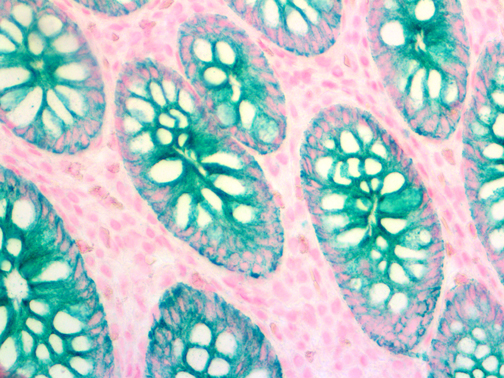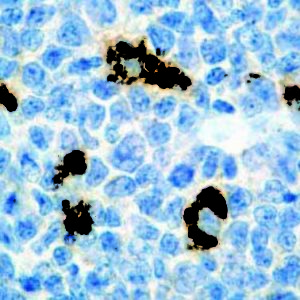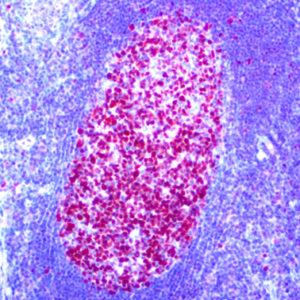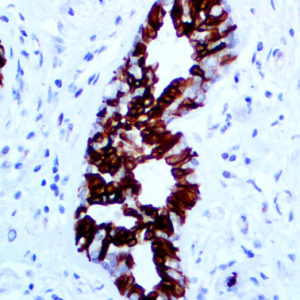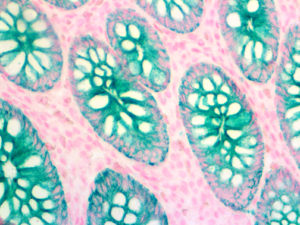
IHC of Cytokeratin Oscar on an FFPE Colon Carcinoma Tissue
| Intended Use | For In Vitro Diagnostic Use | |||||||||||||||||||||||||||||||||||
| Summary and Explanation | Anti-Cytokeratin OSCAR is well-suited to distinguish Epithelial Carcinoma from Non-epithelial malignancies and is used to aid Epithelial Tumor classification. Anti-Cytokeratin OSCAR identifies a number of bands corresponding to cytokeratins 7, 8, 18 and 19 (additional bands – cytokeratins – may also be detected). This antibody has been used to characterize the source of various neoplasms and to study the distribution of keratin-containing cells in epithelia during normal development and during the development of epithelial neoplasms. In normal tissues, OSCAR is reactive with most epithelial types tested including bile ducts and hepatocytes in liver, bladder epithelium, breast ducts, bronchial epithelium, endometrium, follicular dendritic cells of lymph node and tonsil, intestinal epithelium of the stomach, duodenum, ileum, colon, rectum, pancreas, ovarian epithelium, pancreatic acini, pituitary acini, pneumocytes, prostate, thyroid and skin. In tumors, OSCAR is reactive with most Carcinomas including Breast, TCC, RCC, Lung, Endometrial CA, Prostate CA, Ovarian CA, HCC, Colorectal CA, Stomach CA and Thyroid CA. It is negative in certain normal tissues including brain, lymphocytes and all cells of hematolym-phoid origin, muscle, brain, nerves, endothelium and in certain tumors including Melanoma, Sarcoma, Lymphoma, PNET/Ewing’s and GIST. This antibody has shown high sensitivity in recognizing epithelial cells and carcinomas. | |||||||||||||||||||||||||||||||||||
| Antibody Type | Mouse Monoclonal | Clone | OSCAR | |||||||||||||||||||||||||||||||||
| Isotype | IgG2a | Reactivity | Paraffin, Frozen | |||||||||||||||||||||||||||||||||
| Localization | Cytoplasmic | Control | Breast, Liver, Prostate, Colon, Skin, Stomach, Pancreas, Tonsil | |||||||||||||||||||||||||||||||||
| Presentation | Cytokeratin OSCAR is a mouse monoclonal antibody derived from cell culture supernatant that is concentrated, dialyzed, filter sterilized and diluted in buffer pH 7.5, containing BSA and sodium azide as a preservative. | |||||||||||||||||||||||||||||||||||
| Availability |
| |||||||||||||||||||||||||||||||||||
| Note: For concentrated antibodies, please centrifuge prior to use to ensure recovery of all product. | ||||||||||||||||||||||||||||||||||||
